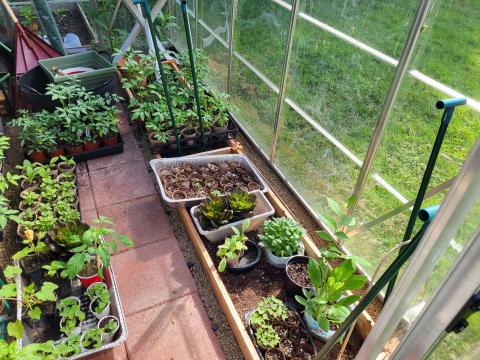As part of their mission to care for Earth, Sisters of Charity of Nazareth in the Pittsburgh area are taking significant steps to improve ecological sustainability efforts. These initiatives range from planting trees and other flora to enhance water retention and promote pollination to pursuing certification as a wildlife habitat.
Caritas Support Services, which sees to the needs of Sisters of Charity of Nazareth residing on their property in the North Hills of Pittsburgh, recently participated in the Keystone 10 Million Trees Partnership, a collaborative initiative aimed at planting 10 million trees in priority areas across Pennsylvania by the end of 2025
During the fall of 2022, CSS received 125 plants and shrubs to be planted on their property off of the busy McKnight Road corridor. Dormant trees were planted on several sites, including the former soccer field on the lower campus, the former practice field behind Vincentian Academy, along the upper cemetery, and various other sites around the property.
In addition to the trees, over 2.5 pounds of native perennials seeds were planted at three sites around the property. The Sisters and staff are cautiously optimistic about the growth of these perennials, which will add native pollinator habitats. Last year, mowing on the property was reduced by 25% to promote the healthy growth of native plants, and a mason bee house was added to the pollinator garden with plans to add more.
Some efforts are already proving fruitful with the increased presence of wildlife such as American Goldfinch, pollinators such as snowberry clearwing moths and honey bees, and beneficial insects such as ladybeetles, native Carolina praying mantis, and hoverflies. Wild turkeys, red and gray foxes, and a small herd of deer have also been seen on the property. CSS looks to have the area certified as a wildlife habitat but needs a sustainable water source to do so. They will attempt to locate a suitable site for a water source in the spring.
With several pollinator-focused efforts underway, CSS is also applying to become a Certified Pollinator Garden through the Penn State Extension program and a representative has enrolled in the Pollinator Steward Certificate program, which provides education on pollinator species and habitat management. They will continue to increase food and shelter for pollinators through planting and reducing the use of pesticides and herbicides.
"We hope our efforts will inspire others in our community to take steps toward sustainable landscaping practices and make a difference in our environment,” said a spokesperson for Caritas Support Services.
